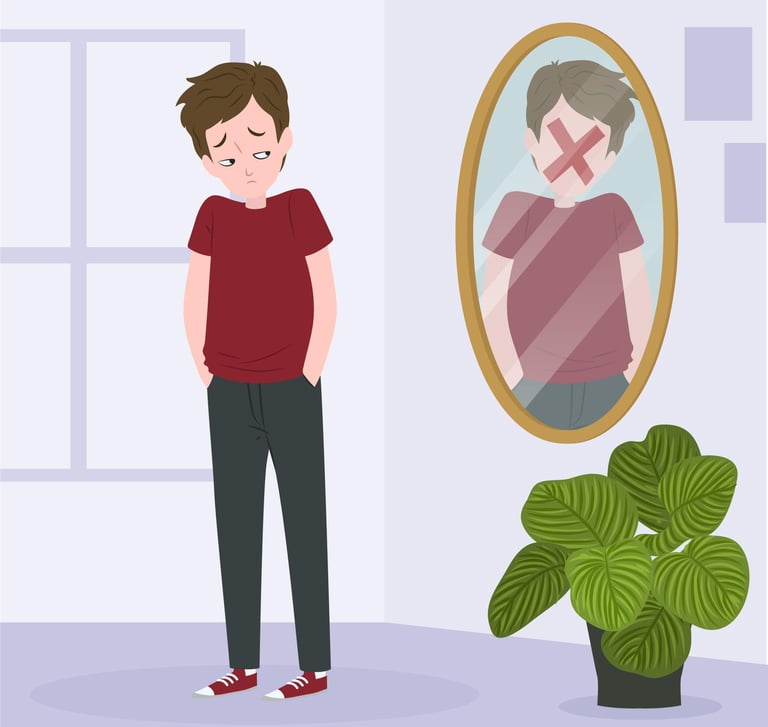9 Clear Signs That Indicate Low Self-Esteem – How to Recognize and Overcome Them
Discover how to recognize and overcome the 9 key symptoms of low self-esteem, empowering you to embrace your true potential.
3 min read


Self-esteem is the foundation of how we perceive ourselves, influencing our thoughts, actions, and interactions with others. When self-esteem is low, it can manifest in various ways, often leaving individuals feeling helpless, insecure, and unworthy. As a result, recognizing these signs early can be key to addressing and improving self-worth.
Here are 9 common symptoms that someone may be struggling with low self-esteem:
1. Constant Self-Criticism
One of the most significant signs of low self-esteem is persistent self-criticism. People with low self-esteem tend to focus on their mistakes or flaws, often dismissing their accomplishments. They may constantly feel that they are never good enough, and the inner voice in their head is full of harsh judgment.
How it shows: This could look like frequently saying, "I’m not good enough," or "I can't do anything right," even when others don’t see it that way.
2. Difficulty Accepting Compliments
When someone lacks self-esteem, they may find it hard to accept compliments from others. They might dismiss praise, downplay their achievements, or assume the compliment is insincere. This reflects an underlying belief that they aren’t worthy of kindness or recognition.
How it shows: A person might say, “Oh, I don’t deserve that,” or “It wasn’t that great, honestly.” or simply a person would point out some other thing about self to divert attention so so-so-good thing about self.
3. Perfectionism
Striving for perfection is a double-edged sword. On one hand, it can drive someone to achieve great things, but when it becomes excessive, it stems from a fear of not being good enough. People with low self-esteem often feel that they must be flawless to be loved or accepted.
How it shows: They may go above and beyond on tasks, even when it’s unnecessary, or feel devastated when they don’t achieve perfect results.
4. Avoidance of Challenges
Those with low self-esteem may avoid challenges out of fear of failure. This avoidance can prevent personal growth, as they might not believe in their ability to succeed or handle difficult situations.
How it shows: They might say, “I’ll never be able to do this,” and choose to sit out opportunities for growth, even when they could excel.
5. People-Pleasing Behavior
A lack of self-esteem often leads to people-pleasing behavior. The person may constantly seek validation from others, even at the expense of their own well-being. They fear rejection or conflict, so they say "yes" to things they don't want to do, hoping to gain approval or avoid disapproval.
How it shows: They may agree to things they dislike, say yes to unreasonable requests, or act in ways that aren’t true to their values, just to keep others happy.
6. Social Withdrawal
Low self-esteem can make people feel socially inadequate. They may avoid social situations because they worry others will judge them or they won’t measure up. This leads to feelings of loneliness and isolation.
How it shows: Someone might cancel plans regularly, avoid parties, or become quiet in group settings because they feel they don’t belong.
7. Overwhelming Fear of Rejection
A person with low self-esteem often fears being rejected or criticized, which can impact their personal relationships and social interactions. This fear may result in them holding back from expressing themselves or distancing themselves from others.
How it shows: They might avoid starting new relationships, hesitate to share personal opinions, or often seek reassurance that they are accepted.
8. Negative Body Image
Body image issues are deeply connected to self-esteem. When someone doesn’t feel good about who they are, it often reflects in how they view their physical appearance. They may be overly critical about their body, no matter how they actually look.
How it shows: Constantly criticizing one's appearance in the mirror, obsessing over weight, or feeling uncomfortable in one’s own skin can be indicators of low self-worth.
9. Difficulty Setting Boundaries
People with low self-esteem often struggle to establish healthy boundaries because they fear conflict or rejection. They may let others take advantage of them or neglect their own needs in favor of others' desires.
How it shows: They may say yes to things they don't want to do or tolerate poor treatment from others, simply because they are afraid of confrontation or being seen as difficult.
Overcoming Low Self-Esteem
Recognizing these symptoms is the first step toward improving self-esteem. A person can begin to heal by practicing self-compassion, setting boundaries, focusing on their strengths, and seeking professional support if necessary. Self-esteem is not an overnight fix, but with consistent effort and a shift in mindset, it can be built and nurtured.
If you or someone you know is experiencing these symptoms, remember that self-esteem is a journey. Acknowledge your worth and take steps to surround yourself with positivity, affirmations, and the right support system. You are deserving of love, success, and happiness, just as much as anyone else.
To conclude, In the quest for better self-esteem, identifying these signs early and addressing them can prevent long-term consequences on mental health and relationships. Whether it’s learning to accept compliments, stop self-criticism, or finding the courage to set boundaries, taking small, positive steps can foster a more confident and fulfilling life.
Get Inspired!
Empowering content for your personal transformation journey.
yellow sunlight © 2024. All rights reserved.
